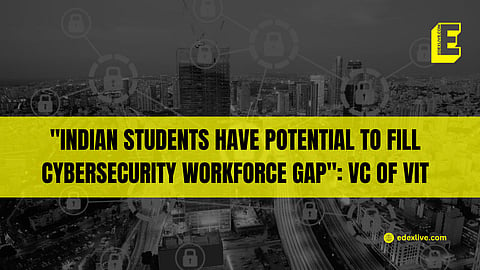"Indian students have potential to fill cybersecurity workforce gap": Vice-Chancellor, VIT
Tell us about the interest in cybersecurity courses when it comes to youngsters. Especially how is it compared to courses like AI, ML and Data Science?
Artificial Intelligence, Machine Learning (AI/ML) and Data Science courses have seen a surge in course offerings across universities, several online platforms, and boot camps due to their high demand in the job market, broad applications, and potential for innovation in these fields.
Availability and access to courses from beginner to advanced levels are widely present.
Cybersecurity courses are fewer in numbers comparatively, which, however, are on the rise in universities and online platforms. The numbers are set to grow, given the fact that career prospects in cybersecurity are also strong, with roles like Security Analyst, Ethical Hacker, and
Cybersecurity Engineer offering good salary packages. The sense of mission in protecting organisations from cyber threats can also be appealingly satisfying.
While AI, ML, and Data Science are often seen as more mainstream, attracting a broader range of students due to increasing demand, cybersecurity is gaining momentum primarily for its critical importance, specialised focus, a strong sense of job security and purpose.
While AI, ML and Data Science courses balance theoretical concepts with practical applications, involving projects and real-world data analysis, with heavy reliance on mathematics and advanced algorithms, cybersecurity education is highly practical, with hands-on problem-solving emphasising labs, simulations, and real-world scenarios and case studies to prepare students for security challenges.
A student who is passionate about security, who enjoys hands-on problem-solving, and seeks a career with a strong sense of purpose might prefer cybersecurity.
Tell us about the interest in cybersecurity courses when it comes to youngsters. Especially how is it compared to courses like AI, ML and Data Science?
Artificial Intelligence, Machine Learning (AI/ML) and Data Science courses have seen a surge in course offerings across universities, several online platforms, and boot camps due to their high demand in the job market, broad applications, and potential for innovation in these fields.
Availability and access to courses from beginner to advanced levels are widely present. Cybersecurity courses are fewer in numbers comparatively, which, however, are on the rise in universities and online platforms.
The numbers are set to grow, given the fact that career prospects in cybersecurity are also strong, with roles like Security Analyst, Ethical Hacker, and Cybersecurity Engineer offering good salary packages. The sense of mission in protecting organisations from cyber threats can also be appealingly satisfying.
While AI, ML, and Data Science are often seen as more mainstream, attracting a broader range of students due to increasing demand, cybersecurity is gaining momentum primarily for its critical importance, specialised focus, a strong sense of job security and purpose.
While AI, ML and Data Science courses balance theoretical concepts with practical applications, involving projects and real-world data analysis, with heavy reliance on mathematics and advanced algorithms, cybersecurity education is highly practical, with hands-on problem-solving emphasising labs, simulations, and real-world scenarios and case studies to prepare students for security challenges.
A student who is passionate about security, who enjoys hands-on problem-solving, and seeks a career with a strong sense of purpose might prefer cybersecurity.
How much of cyberspace do you think students understand? What should students be prepared for when it comes to pursuing cybersecurity academically?
The extent to which students understand cyberspace can vary widely depending on their educational background, exposure to technology, and specific interest in the field.
Students pursuing degrees in computer science, information technology, or cybersecurity typically gain a deeper understanding of cyberspace, covering network architecture, protocols, cybersecurity principles, security challenges, ethical hacking and so on. Exposure to technology through participation in coding clubs, hackathons, and online communities can enhance a student’s understanding of cyberspace. Hands-on experience with programming, networking, and cybersecurity tools can significantly deepen their insights.
Micro-credentials through access to online courses, tutorials, and forums can supplement traditional education with a broader understanding of cyberspace. Understanding general cybersecurity practices like recognising phishing attempts in real-world applications, ethical hacking, penetration testing, and incident response and knowledge on challenges within cyberspace, from basic to advanced levels will give the students a much deeper and more comprehensive knowledge of cyberspace.


